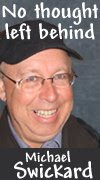© 2009 by Michael Swickard, Ph.D.
Columnists often write about abstract topics such as the legitimate role of government in a free society. But there is a practical component in our lives that is much more important. That core is human dignity. Day by day, we lose more of our dignity and, at death’s door, many are entirely stripped of it. Yet, rarely do we talk about this all-important part of living and dying.
One hundred years from now it will be all new people. We are born, we live and then we die, each in our own way. The amount of dignity we have while we are living and subsequently dying measures our success.
Recently two acquaintances lost their wives. My heart goes out to them. In another place and time my beloved looked up wan and tiny in hospital bed sheets. She asked breathlessly, “Do you know what I’ve learned by my dying so young, so much in the prime of my life?”
I clasped her hand gently, thankful for what seemed a chance to understand this madness, this darkness that came over us suddenly. “What?” I asked.
“Not a thing,” she sighed. She closed her eyes and the lights went out. It took me quite a while to see she was telling me that we learn nothing by death and everything by living. That she had her personal dignity at the time of her death was all we could take from that moment.
Some years ago a doctor said it was cancer and that they had to operate quickly. I realized I was not afraid of dying; I just did not want to be there when it happened because I feared a loss of dignity in my final days.
Worse than death
There is something worse than death. Since we all do have to die, what concerns me is how much dignity I can retain in those final days. The hospice movement of the last couple of decades has been wonderful. It focuses our attention from our inevitable death to the importance of retaining our dignity in those last times.
This is not so with much of what the government does. Our leaders do not recognize the currency of dignity. To me it is as important as freedom itself.
One place we see this is commercial flying. In our stocking feet we are herded through scanning protocols that seem absurd. Governor of Florida and brother of the president, Jeb Bush was pulled aside and wanded a couple of years ago. What is the chance he or Al Gore, another person who was wanded, are terrorists planning on taking over the plane? Absolutely zero.
My buddy Dave and his wife were pulled out of line and carefully screened four times in a single visit to Seattle. Both are well into their 70s and quite feeble. You might make a case that Al Gore was going to snap and hijack the plane, but not Dave and his wife. Our government leaders do not ever think about our dignity. They only think of their power over us.
It is said that where you are when you get your world view at about age 10 leaves a permanent impression upon your thinking. If you were 10 during the depression, you will always feel you should save all you can. I lived in a Japanese village near Tokyo from ages seven to 11. Close friends know I am quite Japanese at heart in that I have a strong belief in duty, honor and respect. I do not insult, nor do I take insults well.
My most difficult moments are when government workers slur me in the ways they do defenseless people. It does not happen every day, but it does often enough. Most of all this is especially of concern with people who are truly defenseless.
Guarding dignity
My favorite aunt passed away a short time ago. Her husband died 10 years earlier and it was just her on the 10 acres just outside of town. Her mother came to New Mexico before statehood as a one-room, rural school teacher. My aunt was steeped in the tea of independence.
While my aunt could be trying to anyone trying to make her do something, she had a heart of solid gold. Still, I realized there would be a day when she could not take care of herself. I prayed she could retain her dignity. More so, I worried that anyone who tried to make her leave her home would end up being gut-shot, and she was just the person to do it.
One October Sunday a year ago my uncle — her brother — was in her town, and they spent a nice day together going out for lunch and talking. That late afternoon they were sitting on the front lawn bench watching the sunset. She said quietly, “I am not feeling well.”
She leaned back and just passed away. Despite how much I will miss her, there is no greater way to check out of this world than in your own yard, your cats near you just after a great sunset, drifting away peacefully. I wish we all could keep our dignity at the end of our lives as she was able to do.
We as a society must guard our dignity from those who would take it, and give special thanks to those who set up hospices specifically to give dignity to those final days and hours.
Swickard is a weekly columnist for this site. You can reach him at michael@swickard.com.

